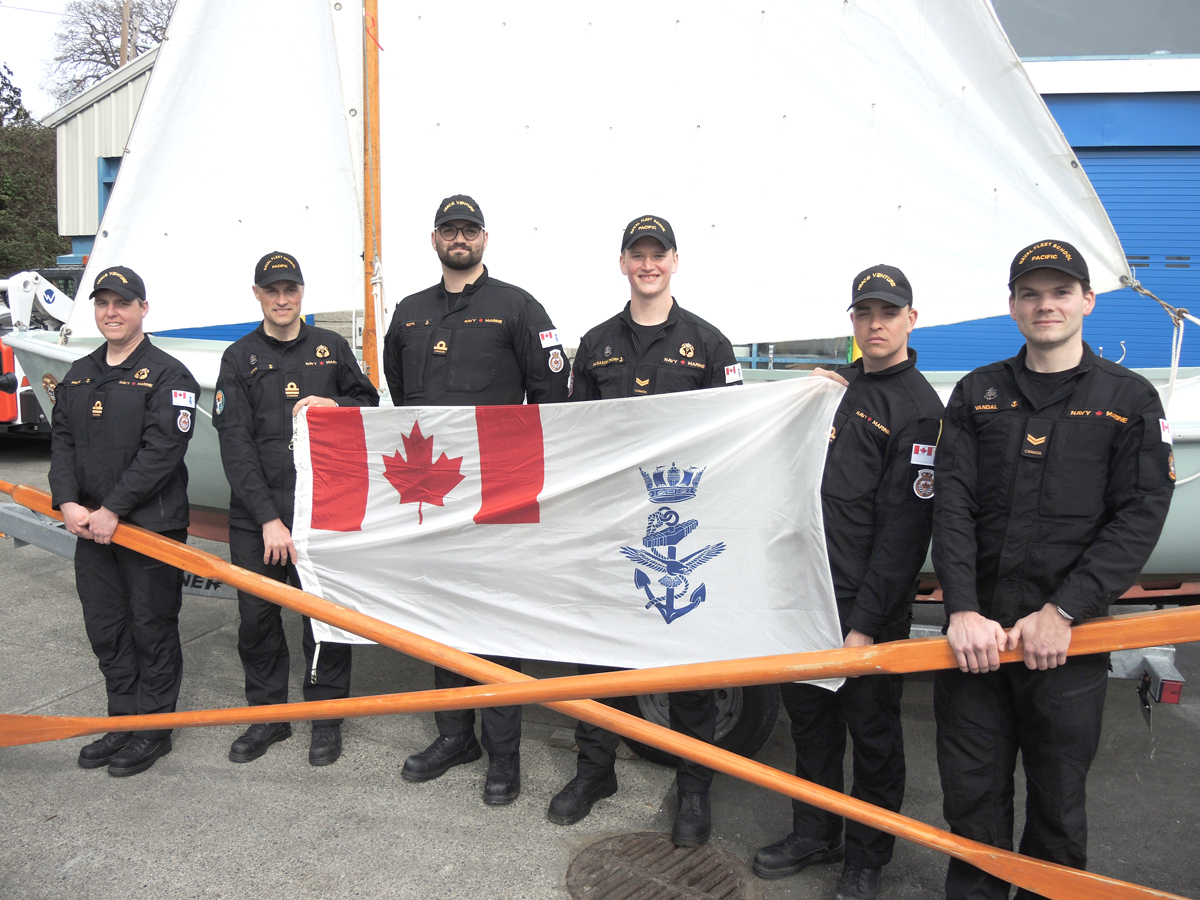It’s ‘Victory Oar Duff’ in race to Alaska
By Lookout Production on May 11, 2024 with Comments 0

Members of the Victory Oar Duff racing team gather for a team photograph on Apr. 10 at the Seamanship Training Centre in Naden. (L-R): Lieutenant (Navy) (Lt(N)) Jeff Phillips, Lt(N) Ellery Down, Acting Sub-Lieutenant (A/SLt) Benjamin Roth, Sailor 1st Class (S1) Evan Helgason-Thorpe, A/SLt Maxwell Lucas, and S1 Maxime Vandal. Photo: Peter Mallett/Lookout Newspaper.
Peter Mallett,
Staff Writer
—
vic·to·ry /ˈvikt(ə)rē/ | noun
an act of defeating an enemy or opponent in a battle, game, or other competition.
oar /ôr/ | noun
a pole with a flat blade, pivoting in an oar lock, used to row or steer a boat through the water.
a pole with a flat blade, pivoting in an oar lock, used to row or steer a boat through the water.
duff /dəf/ adjective, informal
1. Dessert 2. Indicates that something is not working.
—
A team of Royal Canadian Navy (RCN) sailors will soon embark on a perilous race to Alaska in a small, adapted, open-hulled boat with no motor.
The 750 nautical mile Race to Alaska (R2AK) from Port Townsend, Wash., to Ketchikan, Alaska, commences on June 9 and should take 18 to 21 days. The challenge is daunting, but the six members of team ‘Victory Oar Duff’ of Naval Fleet School (Pacific) (NFS(P)) say they are up for it.
“It’s so epic and crazy and such a great idea, why wouldn’t someone want to be involved in this?” said Sailor 1st Class (S1) Maxime Vandal, a Maritime Technician of NFS(P). “I have been in the routine of going to class every day, but this race is a completely different ball game and a chance for adventure and fun.”
Lieutenant (Navy) Ellery Down of Naval Fleet School (Pacific), the team captain, says approximately one-third of the teams entering the infamous race along the Inside Passage to Alaska never finish.
“The Pacific Coast will throw everything at us in terms of winds, waves, rain, fog and currents of up to 15 knots, debris like logs or even dead calm,” he said. “Race organizers like to embellish the challenge a little bit and describe the race as the Iditarod [sled dog race] of the sea, with chance of drowning, being run down by a freighter or being eaten by a grizzly bear.”
Victory Oar Duff will journey in a 28-foot fiberglass Montagu Whaler, which belonged to Naval Reserve Unit HMCS Quadra and was recently donated to NFS(P). Lt(N) Down and his team are presently making alterations and repairs to the vessel, such as equipping it with new sails, covered foredeck and an icebox.
Acting Sub-Lieutenant (A/SLt) Max Lucas, a Naval Warfare Officer of HMCS Venture, loves the choice of the Whaler as a racing craft for the team because of its historic significance. The craft they will sail is the same style of boat used by explorer Earnest Shackleton and crew for their life-saving 800 nautical mile (1,200km) journey across the Southern Ocean from Antarctica in 1916.
Team members quickly point out that victory will almost certainly not be theirs, but completing the course will be all the reward they need. A/SLt Benjamin Roth, also of HMCS Venture, says the R2AK is an exercise in ‘pure seamanship’ and the ‘ultimate challenge’ on the Pacific Coast.
“There will be nothing out there except the boat we are now building and us and the weather, wind and waves,” he said. His teammate, Lt(N) Jeff Phillips, added he didn’t want to regret not embarking on the race later in life.
All team members are avid sailors, and Lt(N) Down says participating in the race is a ‘Bucket List’ challenge for him.
“I think this race really trumpets the fact there are many things to get excited about within today’s Navy and there are opportunities for travel and adventure in the RCN even if it doesn’t involve being in a deployed warship overseas,” said Lt(N) Down.
The team plans to compete in the Round Saltspring Race, May 18 to 19, as a warmup for the R2AK. Updates on the race news and progress of all teams will be available via the webpage r2ak.com/race-news, and a team bio was recently posted on the team race website.
R2AK
The R2AK began in 2015. It permits only sail or human-powered propulsion and involves an eclectic mix of craft, from ultra-fast racing multi-hulled boats to stand-up paddleboards.
Race organizers boast that the competition follows the spirit of maritime tradition, exploration, and self-reliance while cautioning potential competitors that they will require ‘physical endurance, salt-water know-how and the tenacity of a bulldog’ to finish.
The team participates in the race through the Canadian Armed Forces Adventure Training Program. The program typically involves challenging outdoor pursuits aimed at developing participants’ planning, leadership, team-building skills, and mental and physical endurance in potentially hazardous situations, and R2AK fits the bill.
The team will stock the vessel with enough food and water to last the journey. They will also carry onboard a satellite phone, two very high frequency (VHF) radios, an Automatic Identification System receiver, electronic chart navigation system, an emergency position-indicating radiobeacon and a first aid kit. The race rules forbid outside support, so there will be no crew swaps, food drops, or weather routing information.
The top prize for the winners is $10,000; the second-place team gets a set of steak knives.
Filed Under: News Release • Top Stories
About the Author:





